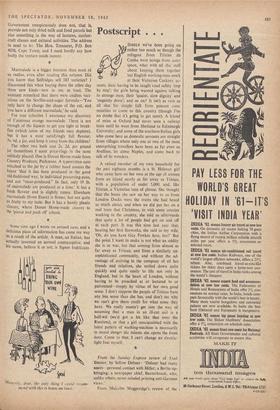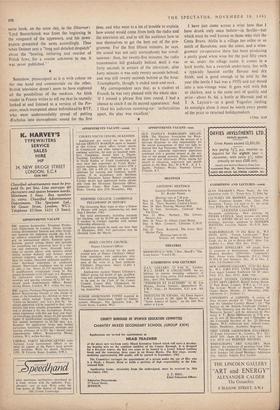Postscript . . .
SURELY we've been going on rather too much as though the refugees • from Vistan da Cunha were beings from outer space, what with all this 'stuff about keeping them together lest English working-men mock at their Victorian Cockne!, ac- cents; their having to be taught road safety 'step by step'; the girls being warned against talking to strange men; their `quaint, slow dignity' and `ungainly dress'; and so on? It isn't as rare as all that for simple folk from peasant com- munities to come to this country (though I've no doubt that it's going to get rarer). A friend of mine at Oxford had never seen a railway train until he went from Shetland to Edinburgh University; and some of the southern-Italian girls who come here as domestic servants are straight from villages where only one or two of the most enterprising travellers have been as far even as Avellino, let alone Naples, and come back to talk of its wonders.
A valued member of my own household for the past eighteen months is a St. Helenan girl who came here on her own at the age of sixteen from an island nearly as far away as Tristan, with a population of under 5,000, and, like Tristan, a Victorian turn of phrase. She thought that the buses she saw on her way to us from London Docks were the trains she had heard so much about, and when we did put her on a real train that Christmas, to visit some cousins working in the country, she told us afterwards that quite a lot of people had got on and off at each port. It was this time last year that, hearing her first fireworks, she said to my wife, 'Oh, do you have Guy Fawkes here, too?' But the point I want to make is not what an oddity she is or was, but that coming from almost as far away as Tristan, and from a similarly un- sophisticated community, and without the ad- vantage of arriving in the company of all her friends and relatives, she settled down quite quickly and quite easily to life not only in England, but in the heart of London, without having to be preached at or lectured to or patronised—simply by virtue of her own good sense. I don't suppose the people of Tristan have any less sense than she has, and don't see why we can't give them credit for what sense they have. We really mustn't get into the way of assuming that a man in an ill-cut suit is a half-wit (we'd got a bit like that over the Russians), or that a girl unacquainted with the latest pattern of washing-machine is necessarily in moral danger the minute she opens the front door. Come to that, I can't change an electric- light fuse myself.
From the Sunday Express review of Trail Sinister, by Sefton Delmer: 'Delmer had many assets—personal contact with Hitler; a Berlin up- bringing; a newspaper chief, Beaverbrook, who, unlike others, never minded printing anti-German views.'
From Malcolm Muggeridge's review of the same book, on the same day, in the Observer: 'Lord Beaverbrook was from the beginning in the vanguard of the appeasers, and his news- papers presented the news accordingly. Thus when Delmer sent a "long and detailed despatch" about the "beating, torturing and murder of Polish Jews, for a reason unknown to me, it was never published."' Somehow, preoccupied as it is with colour on the one hand and commercials on the other, British television doesn't seem to have explored all the possibilities of the medium. An Irish reader in France writes to tell me that he recently looked at and listened to a version of the Per- sians, much trumpeted about beforehand by RTF, who were understandably proud of putting feschylus into stereophonic sound for the first time, and who went to a lot of trouble to explain how sound would come from both the radio and the television set, and to tell the audience how to seat themselves to get the best out of the pro- gramme. For the first fifteen minutes, he says, the sound was not only stereophonic but simul- taneous: then, for twenty-five minutes, the radio transmission fell gradually behind, until it was forty seconds in arrears of the television; after forty minutes it was only twenty seconds behind; and was still twenty seconds behind at the hour. Triumphantly, though, it ended neck-and-neck.
My correspondent says that, as a student of French, he was very pleased with the whole idea : 'if I missed a phrase first time round, I had a chance to catch it on its second appearance.' And I liked his judicious summing-up: 'technicalities apart, the play was excellent.' I have just come across a wine here that I have drunk only once before-in Seville-but which must be well known to those who visit the Costa Brava. Alella is a village ten miles or so north of Barcelona, near the coast, and a wine- growers' co-operative there has been producing a pretty good white wine for the past fifty years or so, under the village name. It comes in a hock bottle; has a sweetish under-taste, but with a typically Spanish earthy flavour and dry finish; and is good enough to be sold by the year (the bottle I had was a 1955) and not mixed into a non-vintage wine. It goes well with fish or chicken, and is the same sort of quality and price--about 8s. 6d. a bottle at Harrods and at T. A. Layton's-as a good Yugoslav riesling. In nostalgia alone it must be worth every penny of the price to returned holidaymakers.
CYRIL RAY











































 Previous page
Previous page